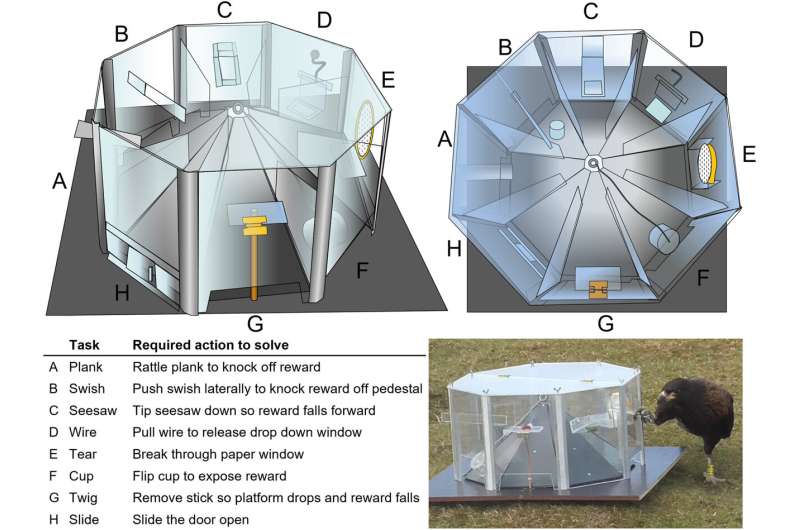Eight-task innovation box and movements required to solve each task panel. Octagonal transparent Perspex innovation box with a transparent lid, eight removable transparent Perspex task panels (17 × 24 cm), and an opaque wooden base, custom-built by Markus Fitzka (Messerli Research Institute, University of Veterinary Medicine, Vienna). Bottom left: movement required to solve each task panel. Bottom right: a juvenile striated caracara uses a foot to solve the plank task. Credit: Current Biology (2023). DOI: 10.1016/j.cub.2023.10.061
A team of comparative cognition researchers at the University of Veterinary Medicine Vienna, working with a colleague from Instituto de Investigaciones Marinas y Costeras, in Argentina, has found that a type of falcon can perform as well as Goffin's cockatoos in solving puzzles to gain a food reward.
In their study published open-access in the journal Current Biology, the group modified a puzzle box originally designed to test Goffin's cockatoos' problem-solving abilities to test those of the striated caracaras.
Striated caracaras live only on the Falkland Islands, at the southern tip of South America and Tierra del Fuego, where they are known locally as Johnny rooks. They are a kind of falcon, but do not act like other falcons, the researchers state. Instead, they act a lot more like kea parrots—a curious and intelligent parrot that lives in New Zealand. Such behavior made the research team wonder if the birds might do well with puzzle boxes.
By solving a puzzle box, a bird gains access to a treat. The boxes have been used as a means to test problem-solving abilities in several types of birds (and other animals)—and by extension, their intelligence. In this new study, the researchers obtained puzzle boxes created and used to test Goffin's cockatoos, which are known to be inquisitive and intelligent. The team modified the boxes to test birds with talons and sharp, bent beaks. Each puzzle box had eight puzzles, including dragging a door sideways, pushing a lever and tearing through a piece of paper.
The research team set the puzzle boxes out on an open parcel of land and waited. They noted that it only took a few minutes for the wild Johnny rooks to take notice. They watched as the birds systematically tried to solve the puzzles as a means to gain access to the treats, which were chunks of fresh red meat. No training was required.
The research team noted that 15 of the birds found the puzzle box and attempted to solve the puzzles—all 15 succeeded in solving at least one puzzle and 10 succeeded in solving all of them. The researchers noted that some of the birds solved some of the puzzles that none of the Goffin's cockatoos had been able to solve, and they generally solved them more quickly.
More information: Katie J. Harrington et al, Innovative problem solving by wild falcons, Current Biology (2023). DOI: 10.1016/j.cub.2023.10.061
Journal information: Current Biology
© 2023 Science X Network
























